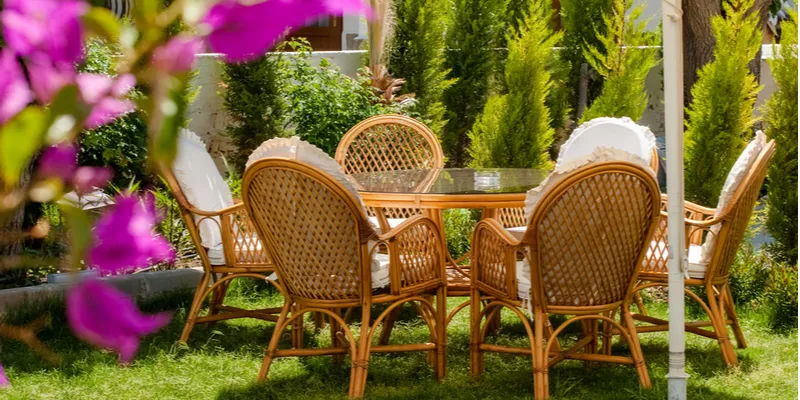Want to save the planet? Cane and bamboo can come to the rescue
Looking for a sustainable alternative to wood? Invest in bamboo and improve the environment
As dark clouds of climate change hover over our heads, it is time we stitch sustainable alternatives into our mainstream fabric. One of the lifestyle changes that we can inculcate is adopting bamboo into the spaces we live. Bordoloi, an entrepreneur from the bamboo-rich North-Eastern region, shares how he opted to work with cane and bamboo to promote a sustainable lifestyle.
When you walk into a furniture store, a pleasant smell emanates from the furniture and comes wafting to your nose. Did you know that this is the smell of a volatile organic compound and not that of new furniture?
Simply put, the smell is the result of treatment of wood with chemicals that are hazardous to the environment around us. This is typical of compressed wood or laminated wood, made up of resin, adhesives, paint, polish, and chemicals.
But wood is a major part of our lifestyle. Is there any alternative to wood?
The answer is grass. Before you roll your eyes, let me clarify, by grass I mean, bamboo. This alternative raw material, found in abundance, comes to the planet’s rescue in the age of climate change, deforestation and depletion of resources. Its usefulness and speed of growth makes it a hands-down winner in the area of sustainability.
Bamboo, above all

Bamboo furniture is both planet friendly and beautiful
Bamboo has higher flexural and compressive strength than wood, is lighter than steel, has the ability to bend without breaking, and releases 35% more oxygen than other plants and takes in 20% more carbon-dioxide, thus improving the quality of air. To top it all, bamboo plants are anti-bacterial, thereby having zero need for pesticidal spray.
Such excellent characteristics make bamboo perfect for a sustainable lifestyle. Across the world, several environmental enthusiasts have been reforming different areas with bamboo usage. One such entrepreneur from the North-Eastern part of our country is S M S Bordoloi.
Business with cane and bamboo
Bordoloi, founder and CEO of Boocane, discovered a mine field of sustainability when he dug deep into bamboo and cane design after years of work in media and marketing. Boocane, a startup headquartered at Guwahati, marries decor with sustainability.

S M S Bordoloi, founder Boocane
It began with Bordoloi’s search for sustainable innovations. “It all started when I travelled across the state to find artisans who could make handicrafts out of bamboo and cane. But the more places I went to, the more I realised the need for better design and newer innovations because success rates for bamboo products are low in our country,” he recollects. Bordoloi then spent his time figuring out how to add value to the market through innovations.
“In India, not enough research has been done about unique species of bamboo, particularly in North-East despite it being the highest bamboo growing region of the country,” he points out. Nonetheless, Bordoloi set a standard for himself that what he manufactures must be no less than European standards. After a thorough research, he sourced machinery from Austria and Taiwan, the first of its kind in making laminated bamboo furniture.

Bamboo furniture by Boocane
Technically sound Assamese artisans handle the machines at their factory in Tezpur. “The idea is to do away with woven products of cane. We produce minimalist, contemporary, European designs that suit any kind of setting, be it airports and resorts or one’s living room,” emphasises Bordoli.
The biggest challenge
Boocane started off as an online portal selling bamboo and cane furniture. With the response and feedback from consumers, they figured out their next step - a studio. “These (the furniture items) are products that customers like to see, touch, feel, therefore we launched our studio in Guwahati with some of our products on display,” Bordoloi stresses.
Talking about challenges, he adds, “You can’t cut bamboo during the rainy season; the moisture makes it difficult. Once we’re past this season, we’ll be completing bamboo-laminated furniture process.”
But challenges don’t put Bordoloi off. He believes in changing the game with a great zeal and creativity.
Himalayan cane
The best quality cane that Bordoloi has encountered is the Himalayan cane, a name that he himself has fondly given to the cane grown in the Himalayas.
“It is supposed to be best in the world and its strength and thickness is excellent due to the Himalayan weather conditions, unlike the cane in Indonesia where salinity in the sea leads to fragility in the material. Himalayan cane is exported to Sri Lanka and Dubai also,” he says, with pride.
Upon being asked if he has given a touch of bamboo and cane to his house, Bordoloi laughs, says, “My house is like a bamboo stockyard now!”



1564576749979.png?fm=png&auto=format&h=100&w=100&crop=entropy&fit=crop)






